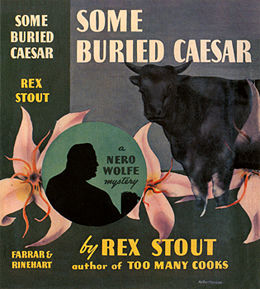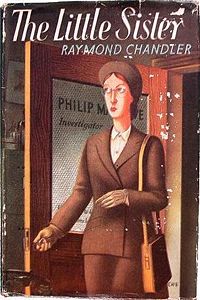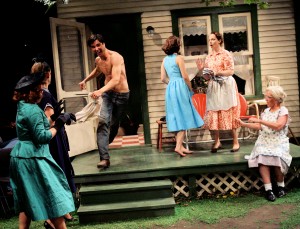“Stupidity, outrage, vanity, cruelty, iniquity, bad faith, falsehood–we fail to see the whole array when it is facing in the same direction as we.”
Jean Rostand, The Substance of Man
Archives for October 2008
TT: Almanac
“I wanted to slap her, because her tone, and the look in her eyes going over me, made me feel like a potato she was peeling.”
Rex Stout, Some Buried Caesar
CD
Dennis Brain: The Horn Player (EMI, four CDs). This specially priced box set contains most of the commercial recordings of the great British horn player whose death in a 1957 car accident deprived the world of one of its most prodigally gifted instrumentalists. Brain’s celebrated studio performances of the concertos of Mozart, Richard Strauss, and Paul Hindemith are all here, together with a generous helping of chamber music, including the exquisitely played versions of Dukas Villanelle and the Schumann Adagio and Allegro that he recorded with Gerald Moore in 1952. If you’ve never heard Brain’s horn playing, prepare yourself to experience a miracle of suavity and grace (TT).
TT: Who’s on first?
 Mrs. T and I just returned from a much-needed holiday at Ecce Bed and Breakfast, our favorite retreat. One of the books that I brought along with me to read was Some Buried Caesar, the sixth of Rex Stout’s Nero Wolfe novels, published in 1939. In it Archie Goodwin makes the following remark about Lily Rowan, his on-again-off-again girlfriend: “I was wondering which would be more satisfactory, to slap her and then kiss her, or to kiss her and then slap her.”
Mrs. T and I just returned from a much-needed holiday at Ecce Bed and Breakfast, our favorite retreat. One of the books that I brought along with me to read was Some Buried Caesar, the sixth of Rex Stout’s Nero Wolfe novels, published in 1939. In it Archie Goodwin makes the following remark about Lily Rowan, his on-again-off-again girlfriend: “I was wondering which would be more satisfactory, to slap her and then kiss her, or to kiss her and then slap her.”
 I must have read the book a dozen times over the years, but never until now had that line caught my eye. Suddenly a coin dropped in my head and I remembered another line: “She reached a quick arm around my neck and started to pull. So I kissed her. It was either that or slug her.” It comes, of course, from Raymond Chandler’s The Little Sister, published in 1949.
I must have read the book a dozen times over the years, but never until now had that line caught my eye. Suddenly a coin dropped in my head and I remembered another line: “She reached a quick arm around my neck and started to pull. So I kissed her. It was either that or slug her.” It comes, of course, from Raymond Chandler’s The Little Sister, published in 1949.
Chandler once told a correspondent that he considered himself “far above” Stout, and very likely he did. But could it possibly be that he was thinking of Some Buried Caesar, consciously or not, when he penned that famous line?
TT: Scenes from a marriage (cont’d)
Time: near the end of a leisurely dinner. Place: Restaurant 15 Main, Narrowsburg, New York. Frank Sinatra’s recording of “Thanks for the Memory” is playing in the background.
SHE I never liked that song.
HE Well–
SHE Don’t say it–I already know what you’re going to say. “Well, I like it.” Of course you like it. You’re got more in common with your parents’ generation than with ours.
HE What do you mean? I know twice as much about rock and roll as you do.
SHE Yeah, but you never hung out in bars and danced with girls when you were in high school.
HE I was always on the bandstand. And how come you don’t like “Thanks for the Memory”?
SHE It’s corny.
HE (with mock outrage) What do you mean, corny? It’s one of the greatest list songs ever written.
SHE One of the what?
HE List songs. You know, songs whose lyrics are a list. “You’re the Top” is the locus classicus of the genre. “You’re the National Gallery/You’re Garbo’s salary/You’re cellophane.” (Triumphantly) What do you say to that?
SHE It’s still corny.
She rolls her eyes.
* * *
Decide for yourself:
TT: Almanac
“The silent bear no witness against themselves.”
Aldous Huxley, Point Counter Point
CAAF: Morning coffee
Yesterday I pointed to Elizabeth Bowen’s “The Demon Lover.” Today continue the ghostly march toward Halloween with Kelly Link’s “The Specialist’s Hat,” which can be found in her first collection, Stranger Things Happen, as well as her latest, Pretty Monsters. As before: print & read in a crowded place.
TT: Hell, Hollywood style
In today’s Wall Street Journal drama column I review two shows, one on Broadway (Speed-the-Plow) and one in suburban Chicago (Writers’ Theatre’s Picnic). The first is uneven, the second…well, perfect. Here’s a excerpt.
* * *
David Mamet writes funny plays about horrible people. “Speed-the-Plow,” in which a pair of vulturine Hollywood executives wrangle over the shapely carcass of a not-so-innocent secretary, was first seen in 1988 in a production that starred Joe Mantegna, Ron Silver and Madonna, a cast about which New York playgoers are still talking. I wasn’t lucky enough to catch it back then, but the 20th-anniversary revival, which features Broadway star Raúl Esparza and two hot young cable-TV guns, Elisabeth Moss of “Mad Men” and Jeremy Piven of “Entourage,” shows that Mr. Mamet’s best play has lost none of its zing in the intervening years–even though Neil Pepe’s well-meaning production isn’t as good as it ought to be.
Like all of Mr. Mamet’s so-called comedies, “Speed-the-Plow” is grimly serious just beneath the surface, a variation on Jean-Paul Sartre’s “No Exit” in which the hell where his three ambitious characters reside is not a locked room but a film studio. Mr. Esparza gets the point, and the results are terrifying to behold. As Charlie Fox, the fawning underling who longs to get out from under and sees his main chance going astray, he twists himself into a double knot of aggression and desperation, then rips himself loose in a comic explosion that rocks the theater….
Mr. Piven, who plays Mr. Esparza’s boss, lacks his knockdown punch. In a Mamet play, the dialogue must sound like an Uzi being fired at a big brass bell, and Mr. Piven, despite his extensive stage experience, is a bit too soft around the edges to keep the bell ringing. As for Ms. Moss, she gives an unconvincingly mousy one-note performance…
 William Inge wrote four Broadway hits in a row between 1950 and 1957, all of which were turned into hit movies. After that he lost his touch, left New York and committed suicide, but throughout the ’50s his track record was so consistent that suspicious critics came to doubt his seriousness. Last season’s Broadway revival of “Come Back, Little Sheba” persuaded me otherwise, and now Writers’ Theatre, a remarkable little troupe based in suburban Chicago, has mounted a production of “Picnic” that blasts the bull’s-eye out of the target. Directed by David Cromer, it is one of the best performances of anything–and I mean anything, not just plays–that I’ve seen in my life, and it also leaves no possible doubt that Inge was not a mere commercial craftsman but an indisputably major artist, one of this country’s half-dozen greatest playwrights….
William Inge wrote four Broadway hits in a row between 1950 and 1957, all of which were turned into hit movies. After that he lost his touch, left New York and committed suicide, but throughout the ’50s his track record was so consistent that suspicious critics came to doubt his seriousness. Last season’s Broadway revival of “Come Back, Little Sheba” persuaded me otherwise, and now Writers’ Theatre, a remarkable little troupe based in suburban Chicago, has mounted a production of “Picnic” that blasts the bull’s-eye out of the target. Directed by David Cromer, it is one of the best performances of anything–and I mean anything, not just plays–that I’ve seen in my life, and it also leaves no possible doubt that Inge was not a mere commercial craftsman but an indisputably major artist, one of this country’s half-dozen greatest playwrights….
Everybody in Writer’s Theatre’s “Picnic,” and everybody involved with it, deserves the highest possible praise. This is a destination show, worth traveling any distance to see.
* * *
Read the whole thing here.
Watch my wsj.com video review of Speed-the-Plow here:
